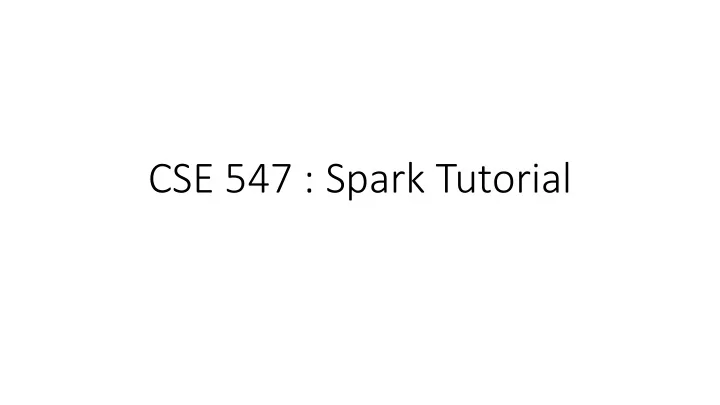

CSE 547 : Spark Tutorial
Topics • Overview • Useful Spark Actions and Operations • Help session
Setup • Follow instructions in HW 0 • Piazza • Office Hour
Deployment Options Local • Stand-alone clusters • Managed clusters • • e.g. YARN
Resilient Distributed Dataset (RDD) • Contain various data type • Int, String, Pair … • Immutable • Lazily computed • Cached • Pair RDD: RDD that only contains tuples of 2 elements • (key, value)
RDD Actions • Not produce new RDDs • Debug, output • take(n) • collect() • count() • saveAsTextFile(path) • foreach(f)
RDD Operation: map • RDD.map(f) • Return a new RDD by applying a function to each element of this RDD >>> rdd = sc.parallelize(["b", "a", "c"]) >>> sorted(rdd.map( lambda x: (x, 1)).collect()) [('a', 1), ('b', 1), ('c', 1)]
RDD Operation: flatMap • RDD.flatMap(f) • Return a new RDD by first applying a function to all elements of this RDD, and then flattening the results. >>> rdd = sc.parallelize([2, 3, 4]) >>> sorted(rdd.flatMap( lambda x: range(1, x)).collect()) [1, 1, 1, 2, 2, 3] [2, 3, 4] -> [[1], [1, 2], [1, 2, 3]] -> [1, 1, 1, 2, 2, 3]
RDD Operation: mapValues • PairRDD.mapValues(f) • Pass each value in the key-value pair RDD through a map function without changing the keys; this also retains the original RDD’s partitioning. >>> x = sc.parallelize([ ("a", ["apple", "banana", "lemon"]), ("b", ["grapes"]) ]) >>> def f(x): return len(x) >>> x.mapValues(f).collect() [('a', 3), ('b', 1)]
RDD Operation: flatMapValue • PairRDD.flatMapValue • Pass each value in the key-value pair RDD through a flatMap function. >>> x = sc.parallelize([("a", ["x", "y", "z"]), ("b", ["p", "r"])]) >>> def f(x): return x >>> x.flatMapValues(f).collect() [('a', 'x'), ('a', 'y'), ('a', 'z'), ('b', 'p'), ('b', 'r')]
RDD Operation: filter • RDD.filter(f) • Return a new RDD that only contains the element the function f returns true on. >>> rdd = sc.parallelize([1, 2, 3, 4, 5]) >>> rdd.filter( lambda x: x % 2 == 0).collect() [2, 4]
RDD Operation: groupByKey • PairRDD.groupByKey() • Group values with the same key together. • Wide operation >>> rdd = sc.parallelize([("a", 1), ("b", 1), ("a", 2)]) >>> result = rdd.groupByKey().collect() >>> print(result) [('a', <pyspark.resultiterable.ResultIterable object at 0x10ffad8d0>), ('b', <pyspark.resultiterable.ResultIterable object at 0x10ffad9b0>)] >>> print([(pair[0], [value for value in pair[1]]) for pair in result]) [('a', [1, 2]), ('b', [1])]
RDD Operation: reduceByKey • PairRDD.reduceByKey(f) • Merge the values for each key using an associative and commutative reduce function. >>> from operator import add >>> rdd = sc.parallelize([("a", 1), ("b", 1), ("a", 1), (”a”, 2)]) >>> sorted(rdd.reduceByKey(add).collect()) [('a', 4), ('b', 1)]
RDD Operation : sortBy • RDD.sortBy(keyfunc) • Sorts this RDD by the given keyfunc >>> tmp = [('a', 1), ('b', 2), ('1', 3), ('d', 4), ('2', 5)] >>> sc.parallelize(tmp).sortBy( lambda x: x[0]).collect() [('1', 3), ('2', 5), ('a', 1), ('b', 2), ('d', 4)] >>> sc.parallelize(tmp).sortBy( lambda x: x[1]).collect() [('a', 1), ('b', 2), ('1', 3), ('d', 4), ('2', 5)]
RDD Operation: subtract • RDD.subtract(RDD) • Return a new RDD containing each value in the original RDD that not in the other RDD. >>> x = sc.parallelize([("a", 1), ("b", 4), ("b", 5), ("a", 3)]) >>> y = sc.parallelize([("a", 3), ("c", None )]) >>> sorted(x.subtract(y).collect()) [('a', 1), ('b', 4), ('b', 5)]
RDD Operatoin: join • PairRDD.join(PairRDD) • For each pair of pairs in the original and the other RDDs that have the same key, join their values together in the result RDD. >>> x = sc.parallelize([("a", 1), ("b", 4)]) >>> y = sc.parallelize([("a", 2), ("a", 3)]) >>> sorted(x.join(y).collect()) [('a', (1, 2)), ('a', (1, 3))]
Example: Word Count conf = SparkConf() sc = SparkContext(conf=conf) lines = sc.textFile(sys.argv[1]) words = lines.flatMap(lambda l: re.split(r'[^\w]+', l)) pairs = words.map(lambda w: (w, 1)) counts = pairs.reduceByKey(lambda n1, n2: n1 + n2) counts.saveAsTextFile(sys.argv[2]) sc.stop()
Example: Word Count lines = [’I love data mining.’, ‘data mining is great.’] words = lines.flatMap(lambda l: re.split(r'[^\w]+', l)) words = [‘I’, ‘love’, ‘data’, ‘mining’, ‘data’, ‘mining’, pairs = words.map( ‘is’, ‘great’] lambda w: (w, 1) ) pairs = [(‘I’, 1), (‘love’, 1), counts = pairs.reduceByKey( (‘data’, 1), (‘mining’, 1), (‘data’, 1), (‘mining’, 1), lambda n1, n2: n1 + n2 (‘is’, 1), (‘great’, 1)] ) counts.saveAsTextFile(sys.argv[2]) counts = [(‘I’, 1), (‘love’, 1), sc.stop() (‘data’, 2), (‘mining’, 2), (‘is’, 1), (‘great’, 1)]
Help Session
References • PySpark 2.4.0 documentation https://spark.apache.org/docs/2.4.0/api/python/pyspark.html
Recommend
More recommend